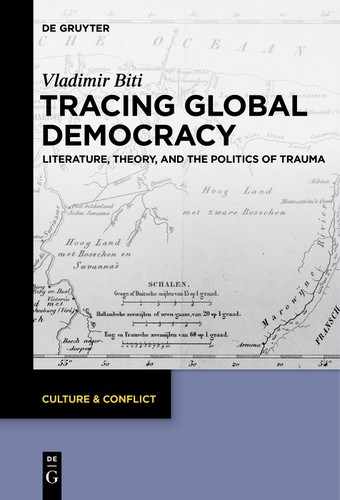0%
30Chapters
0-1Hours read
0kTotal Words
Table of Contents
- Cover
- Title
- Copyright
- Acknowledgments
- Contents
- Introduction
- Part I: Toward a Global Community: The Emergence of the Modern Idea of Literature
- 1 The Divided Legacy of the Republic of Letters: Emancipation and Trauma
- 2 The Fissured Identity of Literature: National Universalism and/or Cosmopolitan Nationalism
- 3 The Janus Face of Literary Bildung: Education and/or Self-Formation?
- 4 Who Voices Universal History? Kant’s “Mankind” and/or Herder’s “Nature”
- 5 Who Worlds the Literature? Goethe’s Weltliteratur and Globalization
- 5.1 Comparative literature as the promoter of globalization
- 5.2 Goethe's detachment from globalization
- 5.3 Getting out of the crowd: Goethe's elitist cosmopolitanism
- 5.4 The acting out of the traumatic experience
- 5.5 A retroactive reinvestment of Goethe's cosmopolitanism
- 5.6 Goethe's trauma narrative: Repositioning German literature
- 5.7 From exemption to expansion: Toward the Roman imperial cosmopolitanism
- 5.8 Translatingthe “iron law of kinship” into the “free competition of values”: The U.S.-American trauma narrative
- Part II: An Observer under Observation: The Cosmopolitan Legacy of Modern Theory
- 6 Interiorizing the Exteriority: The Cosmopolitan Authorization of the Theoretical Truth
- 7 The Narrative of Permanent Displacement: Early German Romanticism and Its Theoretical Afterlife
- 7.1 Reappropriatingthe early Romanticist legacy
- 7.2 The pattern of irritated overcoming: the entangled opponents
- 7.3 Literature against philosophy: Niklas Luhmann's autopoietic turn
- 7.4 Passionately commited to the memory of the whole
- 7.5 The European entangled legacy
- 7.6 The novel as the epitome of evolutionary necessity
- 8 The Oppositional Literary Transcendental: The Russian Formalist Rewriting of Early Romanticist Cosmopolitanism
- 9 The All-DevouringModern Mind: Bakhtin’s Cosmopolitan Self
- 10 Countering the Empirical Evidence: From Immigrant Cosmopolitanism to a Cosmopolitanism of the Disregarded
- 10.1 Abstracting from natural transcendentals
- 10.2 Dis/empoweringthe cosmopolitan police
- 10.3 At the empowering service of a powerless victim: Emmanuel Levinas
- 10.4 The disabling enablement of the theorist: Maurice Blanchot and Michel Foucault
- 10.5 Empowering the literary transcendental: Jacques Derrida
- 11 Political and/or Literary Community: From Class to Messianic Cosmopolitanism
- 12 Literature as Deterritorialization: New Vistas for Democracy?
- Epilogue The Practice of Recommencing: Toward a Cosmopolitanism of the Dispossessed Belonging
- References
- Index
- Endnotes
